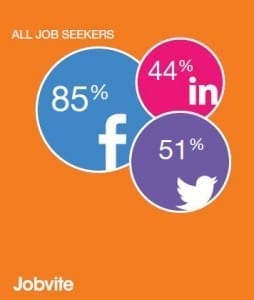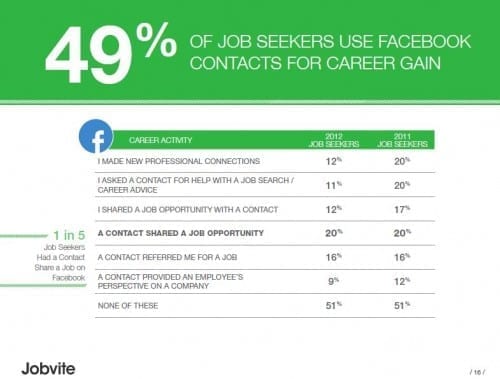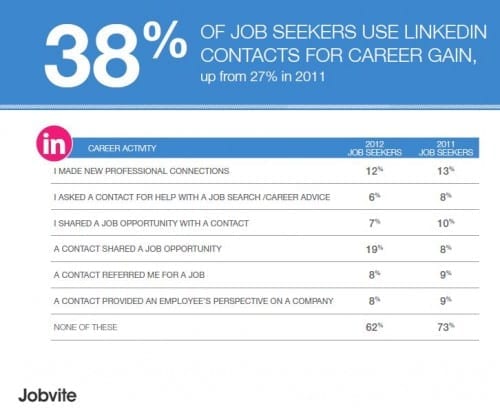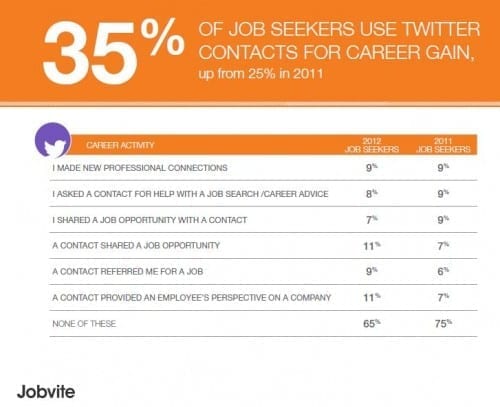 Jobvite recently surveyed job seekers on how they currently use social networks.
Jobvite recently surveyed job seekers on how they currently use social networks.
What did we learn? The study revealed that job? seekers can, and should, do much more to proactively look for employment via social media.
Companies are changing how they find and hire talent, especially via social media and through referrals. Yet this shift doesn?t match the actions taken by job seekers. If you?re currently looking for a job, or considering a change? this survey data is important for you to know:
69 Percent are ?Passive? Job Seekers
Jobvite?s study reports 69% of employed Americans are seeking, or are at least open to, a new job.
- 9% are employed and actively seeking a new job
- 60% are employed and open to a new job
Let this be a warning to all companies? your employees want to leave you! For job seekers: the data point means there is huge competition out there; more than you ever imagined.
It is Harder to Find A Job

When 61% say it is harder to find a job this year than last year, shouldn?t that mean they need to try new tactics and strategies? If you continue to do what you?ve always done, won?t you continue to get the same results?
Social Profiles Don?t Equal Use
 Job seekers, even though they have a social media account open, are not actively using social media in their job search strategy:
Job seekers, even though they have a social media account open, are not actively using social media in their job search strategy:
- 85% of? job seekers have a Facebook profile
- 44% of job seekers have a LinkedIn profile
- 51% of job seekers have a Twitter profile
Merely having a profile isn?t going to be enough. One of the largest misconceptions: ?If I put it out there, they will find me!?
While that CAN happen, the true value of social networks happens when you connect with people, mine your network for meaningful industry data and trends (not job postings), and ask for advice and information.
What Actions Do Job Seekers Take On Social Networks?
As you read through this list of how job seekers most commonly use social media to job search, ask yourself: ?Can we call items one through four proactive job search techniques or activities??
- Updated profile with professional information
- Provided your own profile on a job application or during an interview
- Modified privacy settings with work in mind
- Searched for jobs
- Researched a potential employer before and during application process
- Connected with a potential employer
- Had contact with a recruiter
- None of these
The answer: No!
These are reactive job search actions. No wonder those interviewed for the study found it harder today to find a job; they are engaging in the most competitive, congested, and less productive activities.
In fact, the ?none of these? responses were quite high across all three social networks: 48% on Facebook, 62% on LinkedIn, and 66% on Twitter. In my mind, this indicates the typical job seeker is?missing opportunities to connect with potential employers and not really users of social networks, but takers!
Facebook Faux Pas
One area of improvement: more job seekers are taking steps to ?professionalize? their Facebook accounts by updating professional experience:

51% of job seekers are NOT using Facebook for career gain, however. In other words, they did NOT do any of the following activities tied to job seeking:
- I made new professional connections
- I asked a contact for help with a job search or career advice
- I shared a job opportunity with a contact
- A contact shared a job opportunity
- A contact referred me for a job
- A contact provided an employee?s perspective on a company
Their primary use of social media: they looked for posted jobs? just like we did 10 years ago. Fail!
Loosely LinkedIn
Even on LinkedIn, 62% of job seekersare NOT using the most powerful network for career gain:

I?m not sure why they are on the network at all? and, frankly, I would be interested to know if they are serious about transitioning to a new job!
Twitter Trouble
Twitter isn?t much different: 65% of those surveyed reported they did not use Twitter proactively. While they did receive referrals and job leads, only 7% shared leads themselves.

Social Networks Are?
There are certain strategies great marketers use to build brand awareness and promote their product across social networks. Job seekers would benefit from these best practices? by improving how they leverage the power of social networks:
- Engage in discussion with potential customer, clients, employers
- Pull, don?t push your message; create valuable content and draw your customers to you (this means more than updating a profile)
- Give to get; in other words, help others more than you promote yourself
- Uncover the needs and wants of potential customers, clients, employers and develop a campaign to reach them
- Follow great thinkers within potential companies
- Build a tribe! Partner with organizations and people who believe in you and will help distribute your message
- Systematically and purposefully grow your network with people who can help
- Consistently ask for advice and help!
- Be authentic (but cross the line into inappropriate)
If you consider yourself a ?business of one?, ready to actively use social media to find your next job, these actions should make sense? and you?ll go far through networking, community building and self-learning.
If, however, you are among those just looking for social media to find a job, or a job posting, you may be at this a very long time.
?
![]()
![]()
?
For this post, YouTern thanks our friends at Career Sherpa!
?
![]()
?
 About the Author: Hannah Morgan is a career sherpa, guiding new job seekers through the treacherous terrain of job search. If you are looking for no-nonsense advice, check out her site Career Sherpa, and follow Hannah on Twitter for the latest job search news and trends!
About the Author: Hannah Morgan is a career sherpa, guiding new job seekers through the treacherous terrain of job search. If you are looking for no-nonsense advice, check out her site Career Sherpa, and follow Hannah on Twitter for the latest job search news and trends!
?
Image courtesy of FreeResumeBuilder.org, thank you!
?
?
google maps 8 bit mirror mirror robyn texas relays meniscus the colony kids choice awards
No comments:
Post a Comment
Note: Only a member of this blog may post a comment.